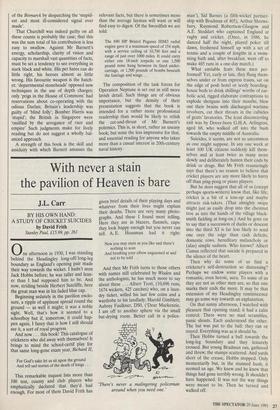With never a stain the pavilion of Heaven is bare
J.L. Carr
BY HIS OWN HAND: A STUDY OF CRICKET SUICIDES by David Frith Stanley Paul, L15.99, pp. 261 0 ne afternoon in 1930, I was standing behind the Headingley long-off/ long-leg boundary as England's opening pair made their way towards the wicket. I hadn't seen Jack Hobbs before; he was taller and lean- er than I had supposed him to be. And now, striding beside Herbert Sutcliffe, here the great man was in his faded blue cap.
Beginning sedately in the pavilion enclo- sure, a ripple of applause spread round the ground — as well it might; it was a noble sight. Well, that's how it seemed to a schoolboy but if, tomorrow, it could hap- pen again, I fancy that is how I still should see it, a sort of royal progress.
And now . . . this book! This catalogue of cricketers who did away with themselves! It brings to mind the school-certif play for that same long-gone exam year, Richard II,
For God's sake let us sit upon the ground And tell sad stories of the death of kings . . .
This remarkable inquest lists more than 100 test, county and club players who emphatically declared that they'd had enough. For most of them David Frith has given brief details of their playing days and whatever from their lives might explain their deaths. There are very many photo- graphs. And these I found most telling. Here they are in blazers, flannels, caps: they look happy enough but you never can tell. A. E. Housman had it right:
Now you may stare as you like and there's nothing to scan And brushing your elbow unguessed at and not to be told . . .
And then Mr Frith turns to those others with names still celebrated by Wisden and the anthologists; he has much more to say about these . . . Albert Trott, (10,696 runs, 1674 wickets, 425 catches) who, on a laun- dry ticket, willed his last few coins and a wardrobe to his landlady; Harold Gimblett; Aubrey Faulkner, DSO, ('Dear Mackenzie, I am off to another sphere via the small bat-drying room. Better call in a police- 'There's never a malingering policeman around when you need one.' man'), Sid Barnes (a fifth-wicket partner- ship with Bradman of 405), Arthur Shrews- bury, Raymond Robertson-Glasgow and A.E. Stoddart who captained England at rugby and cricket. (Once, in 1886, he danced half the night, played poker till dawn, freshened himself up with a set of tennis and a couple of lengths in a swim- ming bath and, after breakfast, went off to make 485 runs in a one-day match.) What enviable feats these men per- formed! Yet, early or late, they flung them- selves under or from express trains, sat on the edge of posh hotel or seedy boarding- house beds to drink shillings' worths of car- bolic acid, rigged elaborate contraptions to explode shotguns into their mouths, blew out their brains with discharged wartime revolvers, cut their throats in the cubicles of gents' lavatories. The least disconcerting exit was by Dover-born G.H.A. Arlington, aged 68, who walked off into the bush towards the empty middle of Australia.
Suicides, it seems, are not so uncommon as one might suppose. In any one week at least 100 UK citizens suddenly kill them- selves and at least twice as many more slowly and deliberately hasten their ends by drink or drugs. But Mr Frith reassuringly says that there's no reason to believe that cricket players are any more likely to hurry off than ping-pong or piano players.
But he does suggest that all of us (except perhaps sports-writers) know that, like life, cricket is a bit of a toss-up and maybe attracts risk-takers. (That almighty swipe might just as easily drop into the chestnut tree as into the hands of the village black- smith fielding at long-on.) And he goes on to say that a succession of ducks or descent into the third XI is far less likely to send one over the edge than cash deficits, domestic rows, hereditary melancholy or (alas) simple sadness. Who knows? Albert Camus reflected that suicide is prepared in the silence of the heart.
Then why do some of us find a cricketer's self-destruction so distressing? Perhaps we endow some players with a romantic, even heroic, aura. To some of us they are not as other men are, so that one marks their ends the more. It may be that extension of my Headingley reminiscence may go some way towards an explanation.
On that sunny afternoon, I watched with pleasure that opening stand; it had a calm control. There were no mad scrambles, panic shouts. Each understood the other. The bat was put to the ball: they ran or stayed. Everything was as it should be.
Then Hobbs turned a ball towards the long-leg boundary and they leisurely crossed. But young Bradman ran, gathered and threw; the stumps scattered. And yards short of the crease, Hobbs stopped. Only momentarily but, in the stunned hush, it seemed an age. We knew and he knew that things had gone terribly wrong. It shouldn't have happened. It was not the way things were meant to be. Then he turned and walked off.


















































 Previous page
Previous page